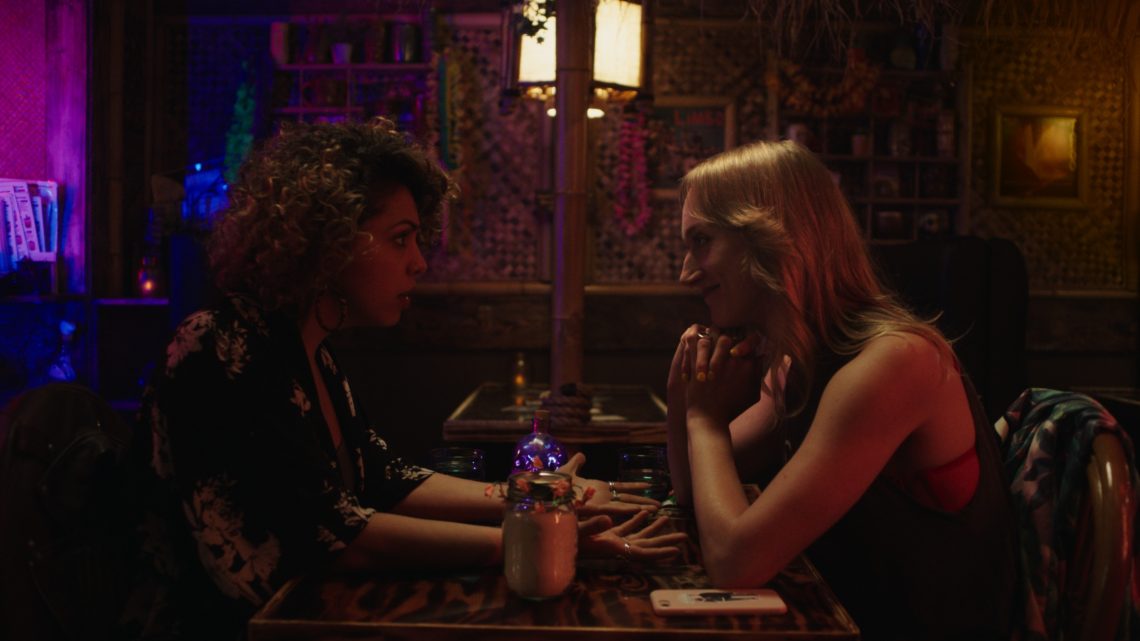
Volcano Interview: Karen Moore
“The idea came from personal experience — both with romantic relationships and friendships. I’ve been both women in the film and it’s a sort of exploration of those different people that exist within us.”
We have all been both these women.
VOLCANO, a short film by director Karen Moore, examines Jess and Hannah’s friendship as they meet up after some time apart.
The tiki bar is a unique choice for this conversation, a clear distraction for the real issues Hannah and Jess are avoiding, yet dark and intimate enough for a real conversation to emerge.
As one friend happily discusses her dreamy vacation, the other, frustrated with her own romantic setbacks, can’t seem to break through to what is really going on. These characters are confusing and aggravating but aren’t unlikeable, they feel real.
VOLCANO is a touching short film that explores many topics in its brief time and gives its two leads —Hannah Cheesman and Jess Salgueiro— the space to shine.
VOLCANO had its World Premiere at the 2019 Toronto International Film Festival.
Tell us a little bit about yourself, what you did on the film and how you got involved with filmmaking.
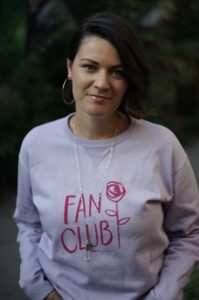 Karen Moore: I’m Karen — writer/director of Volcano — and I’ve primarily been a TV writer (Mary Kills People, Workin’ Moms). I was an executive producer/writer on the CBC Gem series Detention Adventure and have written/produced three other short films (Must Kill Karl, Frozen Marbles, Your Place or Mine). I’ve been a part of the Toronto film & television world since attending Ryerson University for Radio + Television Arts (‘07). Volcano is my directorial debut.
Karen Moore: I’m Karen — writer/director of Volcano — and I’ve primarily been a TV writer (Mary Kills People, Workin’ Moms). I was an executive producer/writer on the CBC Gem series Detention Adventure and have written/produced three other short films (Must Kill Karl, Frozen Marbles, Your Place or Mine). I’ve been a part of the Toronto film & television world since attending Ryerson University for Radio + Television Arts (‘07). Volcano is my directorial debut.
Tell us about Volcano, and where the idea for the film came from.
KM: Volcano is a two-hander tug-of-war conversation between two friends, Hannah and Jess, who meet for a catch-up over tiki drinks that quickly goes off the rails in a funny-till-it’s-not kind of way.
The idea came from personal experience — both with romantic relationships and friendships. I’ve been both women in the film and it’s a sort of exploration of those different people that exist within us.
Volcano shows the uglier side of relationships, both friendly and romantic. Why did you want this to be the focus of your film?
KM: My intention was to show two friends that are struggling to connect because there’s an elephant in the room that one of them doesn’t know exists. I think when we don’t get what we want/need/expect from our friends or lovers, we often assume it’s because of us & have no idea what’s really going with that person. By the end of the film, everything’s on the table — ugly truth and all, and they can finally come together.
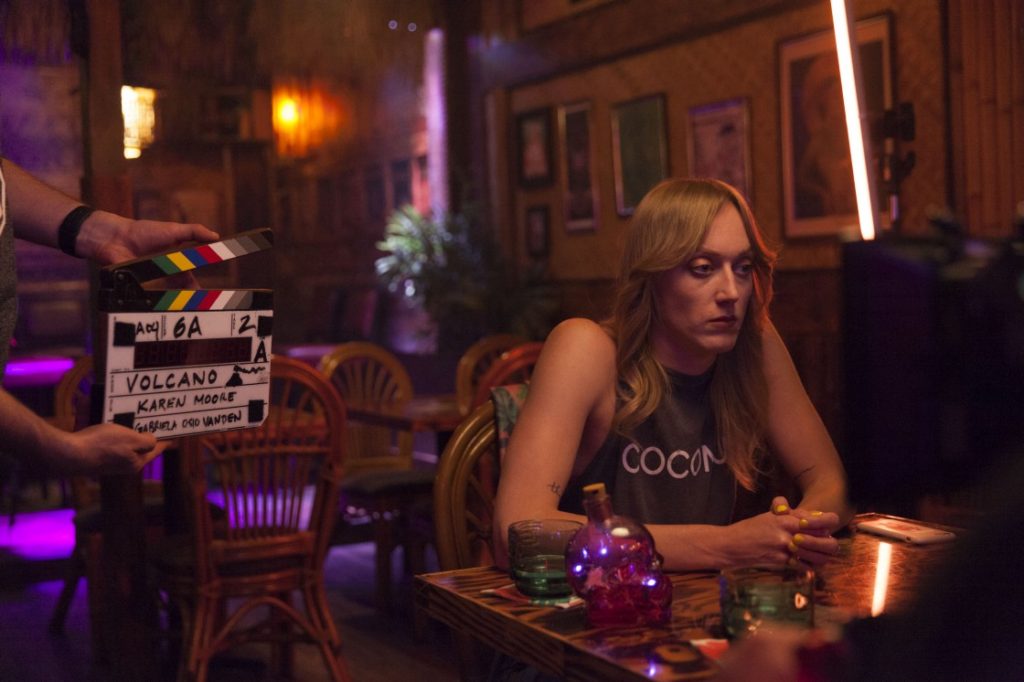
Can you speak about why you created these specific characters and the motivations behind them?
KM: I knew I wanted to cast Hannah Cheesman and Jess Salgueiro in the film, so I somewhat shaped the characters to their voices. I pictured how they would deliver the jokes and the more sensitive material, and it really helped me hone the script. I wanted Jess to be a bit of a brat, so off the top, we think she’s just being a selfish friend who doesn’t want to listen to her pal gush about her happy relationship. And I wanted Hannah’s character to have a growing manic energy that intensifies as Jess doesn’t give her the reassurance she needs.
The bar setting was amazing, why did you choose this as a backdrop for your story?
KM: The Shameful Tiki Room became a character in its own right in the film. Someone recently described it as the tiki-est tiki bar that ever tiki-ed, which is totally accurate and essentially why I chose it. It’s escapist and filled with fantasy and sort of forced over-the-top fun. It all thematically resonated with the story, in addition to being a basically shooting-ready location absolutely filled with set-dec and amazing lighting.
Can you speak about what it was like for you to make Volcano and what it’s like working in film and television in Canada?
KM: Volcano was a self-financed passion project for me. It’s me investing in my own voice, and giving myself the opportunity to grow as an artist. My work as a TV writer in Canada is the reason I was able to make the film, both financially and in terms of the skills I’ve learned working on those projects. The film and television community in Toronto is tight + supportive, and I called in a lot of favours from peers with this project.
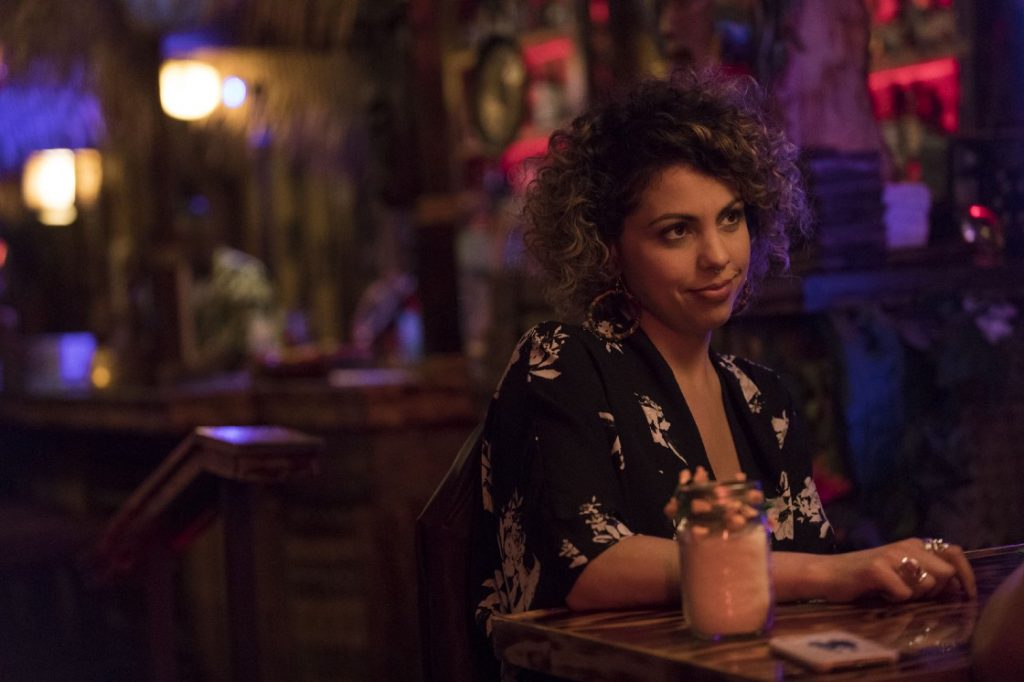
Can you tell us about some/all of the other amazing women who worked on this film?
KM: Alona Metzer is our most excellent producer. She’s my endlessly patient sounding-board (she’ll read this interview before it goes out 🙂 for example)
Gabriela Osio Vanden is our Cinematographer/Camera Op. She’s a real emerging force and will have blown up by the time you finish reading this sentence.
We also had a female production designer — Ashley Devereux, gaffer — Cheska Appave, script supervisor — Sydney Kondruss, H/MU Artist — Tamsin Smith, and of course our amazing actors Hannah and Jess.
Tell us about why you are a feminist and why it’s important to your filmmaking.
KM: The idea of not identifying as a feminist seems quite frankly, f**king bananas. What reason could someone possibly have for not being a feminist? That’s a rhetorical question…
In terms of my own filmmaking, I’m certainly drawn to exploring human relationships through a feminist perspective and looking for less-explored angles into stories and characters through a female lens.
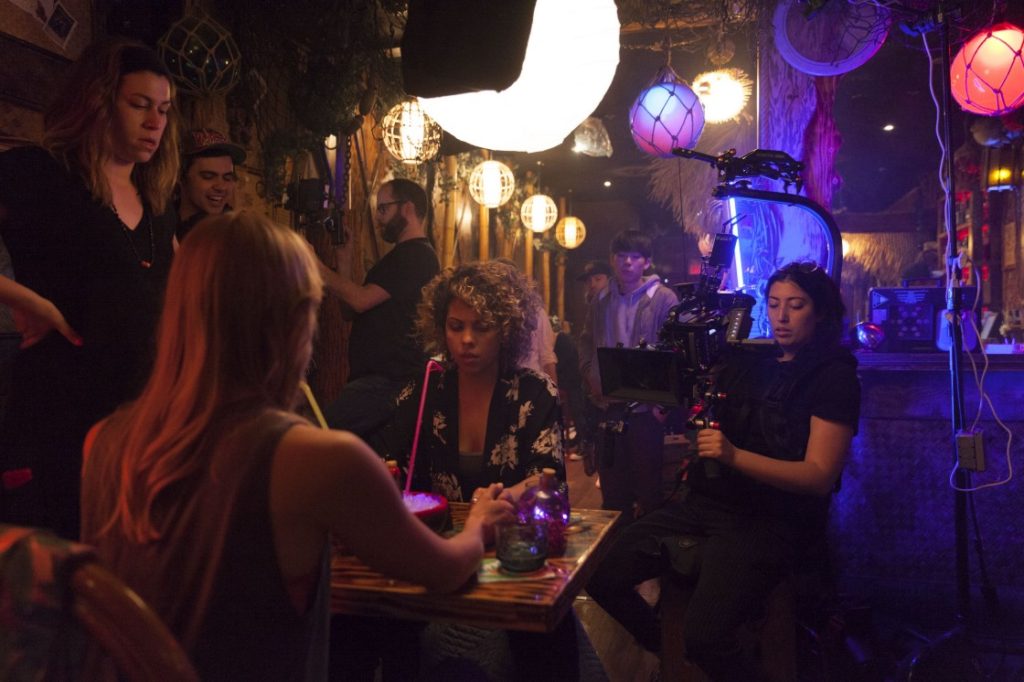
What are you working on now/next?
KM: TIFF is the World Premiere for Volcano, so we’ll be taking the film on the road this fall/winter to festivals — starting with Cinefest Sudbury International Film Festival and FIN Atlantic International Film Festival. In terms of my next project, I’m currently writing a feature that’s a similar blend of comedy + drama as Volcano, and also draws on personal experience.
Finally, recommend one #MUFFApproved film to our readers.
KM: The Farewell by Lulu Wang! The trailer makes it look like more of an American-style family comedy — almost like Meet the Parents or something (not that there’s anything wrong with that…) — but it’s not. It’s beautifully shot (almost all in China) with amazing performances by the whole cast. I really dug how the story unfolded in its subdued way and how that resonated thematically with the juxtaposition of East vs Western ways of life.
Keep up to date with VOLCANO: Twitter | Instagram
*This post was originally featured on The MUFF Society.*

